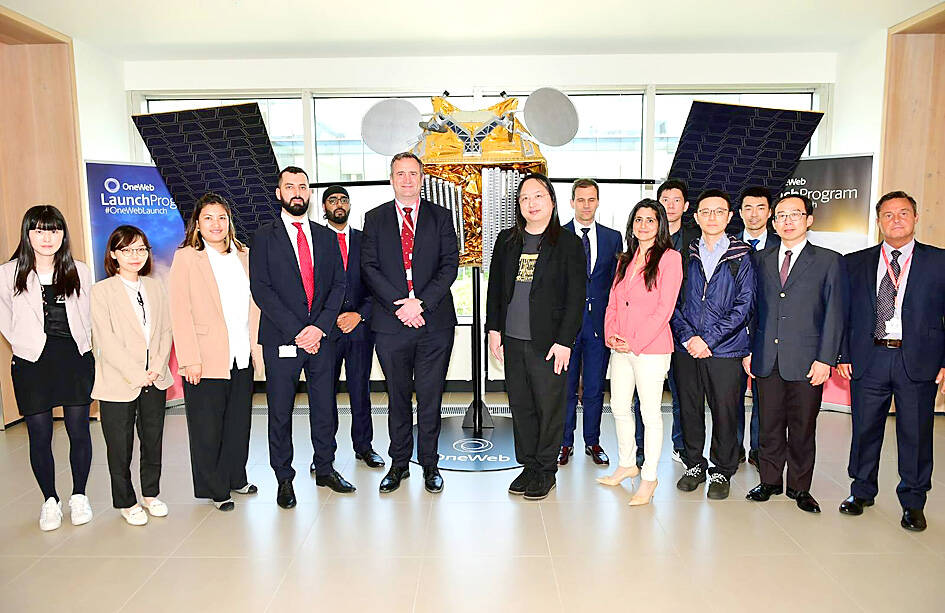The government expects satellite service by British provider OneWeb to cover all of Taiwan by the end of this year, Minister of Digital Affairs Audrey Tang (唐鳳) said.
The service expansion would provide more options for low Earth orbit (LEO) satellites to Taiwan, the Central News Agency quoted Tang as saying.
OneWeb services are currently only available in the northern part of Taiwan, said Tang, who made a rare trip to London earlier this week and visited OneWeb, which specializes in LEO satellites.

Photo courtesy of the Ministry of Digital Affairs
OneWeb, which is backed by the British government, is “very willing” to work with Taiwan to bolster Taiwan’s communication infrastructure, she said.
The government’s disaster response plan calls for the establishment of 700 satellite receivers placed across the country, the Ministry of Digital Affairs said.
Some of the receivers would be fixed and others mobile, and they would have to be configured to receive communications from multiple constellations of satellites in LEO and medium Earth orbit.
However, online commenters yesterday raised concerns, as China has invested in one of OneWeb’s owners, with some saying that working with the satellite operator would run afoul of the ministry’s own regulations.
In July last year, OneWeb announced it would merge with French Satellite operator Eutelsat, in which Beijing-run China Investment Corp (中國投資公司) has a 7 percent stake. Eutelsat’s board approved the merger in November last year, and the deal is to be finalized this year.
An official speaking on condition of anonymity said that the British government would retain a special share in OneWeb that gives London a final say over any partnership with the company or access to its technology.
As a member of the “Five Eyes” alliance with Australia, Canada, New Zealand and the US, the UK can be counted upon to be strict about its national interests and information security, the official said.
The special share is a legal mechanism that grants the government more control over OneWeb than the face value of the share would normally confer, the official said, adding that it would permit London to allow only friendly nations to be part of the company’s supply chain.
Additionally, China owns less than 5 percent of OneWeb and the company falls under the legal category of satellite operator under Taiwanese regulations, the official said.
That means rules barring collaboration with telecom companies with more than 5 percent Chinese shares do not apply to the proposal, as Internet users incorrectly suggested, they said.
The Taiwan Space Agency yesterday said that Taiwan would need more than 120 satellites to create a satellite-based Internet infrastructure, which far exceeds domestic launch capabilities.
The agency also sees no alternative than to seek help from foreign entities to launch the satellites, it said, adding that candidates for partnership would be vetted carefully in line with laws and regulations.
The agency previously said that the satellite project was a necessary measure to address the vulnerability of Taiwan’s undersea Internet cables to sabotage by China.
Additional reporting by Wu Po-hsuan

SECURITY: As China is ‘reshaping’ Hong Kong’s population, Taiwan must raise the eligibility threshold for applications from Hong Kongers, Chiu Chui-cheng said When Hong Kong and Macau citizens apply for residency in Taiwan, it would be under a new category that includes a “national security observation period,” Mainland Affairs Council (MAC) Minister Chiu Chui-cheng (邱垂正) said yesterday. President William Lai (賴清德) on March 13 announced 17 strategies to counter China’s aggression toward Taiwan, including incorporating national security considerations into the review process for residency applications from Hong Kong and Macau citizens. The situation in Hong Kong is constantly changing, Chiu said to media yesterday on the sidelines of the Taipei Technology Run hosted by the Taipei Neihu Technology Park Development Association. With

CARROT AND STICK: While unrelenting in its military threats, China attracted nearly 40,000 Taiwanese to over 400 business events last year Nearly 40,000 Taiwanese last year joined industry events in China, such as conferences and trade fairs, supported by the Chinese government, a study showed yesterday, as Beijing ramps up a charm offensive toward Taipei alongside military pressure. China has long taken a carrot-and-stick approach to Taiwan, threatening it with the prospect of military action while reaching out to those it believes are amenable to Beijing’s point of view. Taiwanese security officials are wary of what they see as Beijing’s influence campaigns to sway public opinion after Taipei and Beijing gradually resumed travel links halted by the COVID-19 pandemic, but the scale of

A US Marine Corps regiment equipped with Naval Strike Missiles (NSM) is set to participate in the upcoming Balikatan 25 exercise in the Luzon Strait, marking the system’s first-ever deployment in the Philippines. US and Philippine officials have separately confirmed that the Navy Marine Expeditionary Ship Interdiction System (NMESIS) — the mobile launch platform for the Naval Strike Missile — would take part in the joint exercise. The missiles are being deployed to “a strategic first island chain chokepoint” in the waters between Taiwan proper and the Philippines, US-based Naval News reported. “The Luzon Strait and Bashi Channel represent a critical access

Pope Francis is be laid to rest on Saturday after lying in state for three days in St Peter’s Basilica, where the faithful are expected to flock to pay their respects to history’s first Latin American pontiff. The cardinals met yesterday in the Vatican’s synod hall to chart the next steps before a conclave begins to choose Francis’ successor, as condolences poured in from around the world. According to current norms, the conclave must begin between May 5 and 10. The cardinals set the funeral for Saturday at 10am in St Peter’s Square, to be celebrated by the dean of the College